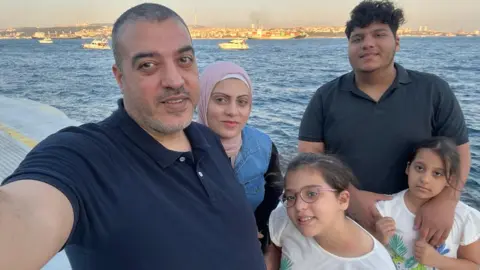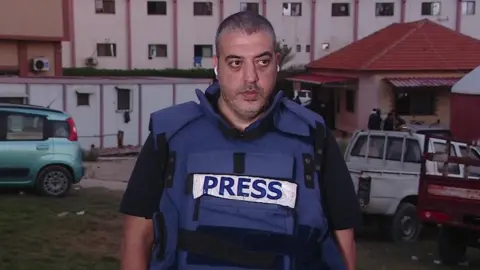Rushdi Abualouf: My daughters beg for Gaza City return - but our old lives are over
 BBC
BBCTwo days ago, my wife and children nearly died.
They were on the ground floor of a four-storey building in Khan Younis, Gaza, near a hospital where I'm sleeping in a tent.
They were about to leave for the day to meet me when an Israeli drone attack punched through the top floor.
My nine-year-old twin daughters ran out into the street screaming, separated from their mother, who was struck in the head by a piece of rubble.
My wife's injuries were, thankfully, minor. But my daughters were traumatised. That night, they stayed up crying, and I had to call up a doctor to ask them what we could do to help them sleep.
My family now spends their nights just a few doors down from the building that was struck, not knowing if they're safe as they close their eyes.
Me, my wife, our daughters and our 18-year-old son have been displaced four times in the two weeks since this war erupted, moving from place to place to heed Israeli warnings of air strikes, our mattresses strapped to the roof of our car. My daughters have had to leave behind everything they love in Gaza City and head south - their school, their friends, their horse riding club, their favourite pizza shop.
Death and life have become equal in Gaza. Bombardment from above is constant. It's all too much for many adults, let alone a child: no nine-year-old on Earth should have to go through this.
My daughters keep trying to hold on to my leg, to hug me, to do anything to feel safe. It will take them a long time to recover, and they will need a lot of support.
Both of them are constantly asking to go back to Gaza City, to relative normality.
Before this latest escalation, we lived a better life than 99% of Palestinians. Electricity here is limited, most of the water was unclean, and getting out - even for a short vacation - is difficult. There are 40-year-olds who have never left this tiny strip of land.
But we have been lucky enough to be able to take holidays abroad sometimes for a month or more at a time. This summer we toured Istanbul, Cyprus, Egypt, and Jordan - my children nearly cried when I told them we had to go back to Gaza.

More on Israel-Gaza war
- Follow live: Latest updates
- Explained: What evidence tell us about Al-Ahli hospital blast
- History behind the story: The Israel-Palestinian conflict
- Hostages: The forgotten Israelis kept by Hamas in Gaza
- West Bank: Palestinians under attack as Israeli settler violence surges

In Gaza City, we had a large flat 400 metres from the beach. My wife and I often walked together on the sand in the morning.
My son went to university and my daughters went to a good school - they go swimming at a club and ride horses. They have their own tablet where they can watch YouTube. I bring them sweets home from work and play with them in the evening - sometimes, they fall asleep in my bed and I carry them to their room in the dark.
Now, the neighbourhood where my children grew up in deserted and flattened by bombs.
Most nights, I visit a friend's house, playing cards and drinking coffee. As a family, we try to go to a nice restaurant once a week, normally the pizza shop or a nearby restaurant that cooks meat in a special pot. We all love it there.
Now, that pizza shop is rubble.

Despite all the difficulties, we try to enjoy ourselves. Gaza is not always a war zone and when there is any chance for joy, we take it. We stick together, and it's that connection - the love of my wife, my daughters, and my son - that keeps me strong, whether the situation is good or bad.
Even today in the middle of this war, we still try to find moments of happiness whenever we can. My children visit me when I'm working - they put on my flak jacket, my helmet, and we laugh together. They pick up the microphone and pretend they're correspondents.
But life for them will never be the same. My daughters keep asking about the places they remember from before, about the market we used to shop in. They are begging to go back. They don't understand that we cannot return.
Every day, doctors and others who remain in the north tell me about another building destroyed - another road cratered, another petrol station blown up.
After their building was struck, I made a promise to my family that I will get them out of Gaza when this is all over, away to a safe place. They have sacrificed enough.
Just before we fled Gaza City to head south with hundreds of thousands of other people, I walked around our flat, cherishing all the memories my family and I made there.
I turned to my wife and said: "Have a look at this lovely home. We might not ever come back."
Today, I'm sleeping in a tent, thinking of my normal bed, of drinking coffee by the sea. These are now just dreams.
